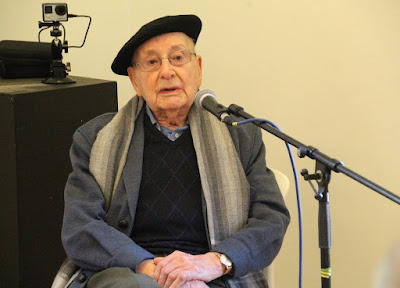Luis Ortiz Alfau was 19 and working at a food warehouse when
Spain's civil war began in 1936. Today almost 100, Luis is one of the last
surviving witnesses of the atrocities of that conflict, from the bombing of the
Basque town of Guernica to the forced labour camps.
"I joined a battalion of the Republican Left in the
first days of August in Bilbao," he recalls at his flat in his hometown of
Bilbao. "As the son of a Republican I had to join because they would surely
call me up and I wanted to defend freedom and the legal Popular Front
government," adds Luis.
"We would practise with brooms... we didn't have rifles
or any war material," says Luis, a 99-year-old widower who lives alone.
Luis refuses to be presented as a brave hero and says he
never fired a single shot during the three-year war that began on July 18, the
most devastating conflict in Spanish history."I was lucky to be assigned
to the transmissions section. I was a living phone. I would go from the
battalion command to the trenches with an envelope," he recalls. "The
messages would ask for weapons, they would say, 'We can't hold on' or 'We have
had many casualties.'" His battalion was resting in a neighbourhood in the
Basque town of Guernica on April 26, 1937 when German planes dropped dozens of
tonnes of bombs -- an atrocity that shocked the world and was immortalised in
Picasso's haunting anti-war painting that year named after the town. "We
had to go out and collect the dead and wounded, everything was burning and full
of smoke, I had never seen so much blood," he said.
In February 1939, Luis fled to neighbouring France where he
experienced the hardships of the camps where Spanish Republicans -- deemed
"undesirable" -- were confined. Journalist Ander Izaguirre, who was
asked by a Basque government institute to write a biography of Luis, says
"what is impressive" about his life story is that he "passed
through the most important places of the war and post-war".
When France entered World War II in September 1939 by
declaring war against Germany, Luis -- like thousands of other Spaniards --
thought the time was right to return to Spain. But he was arrested at the border
and in June 1940 was sent to one of the 121 forced labour camps that were set
up by Franco, to punish the
losing Republican side.
When he finally returned to Bilbao as a free man in 1943,
Luis quickly realised that jobs were reserved for "those who had fought
with Franco". He only found work after he bribed a civil servant to
eliminate his record as a former Republican fighter.
Luis, who will turn 100 tomorrow, on October 13, says he is
"wonderfully happy" and pleased that he has the chance to bear
witness in the name of the former "slaves of the Franco regime".









A real war hero who never fired a shot.
ReplyDelete